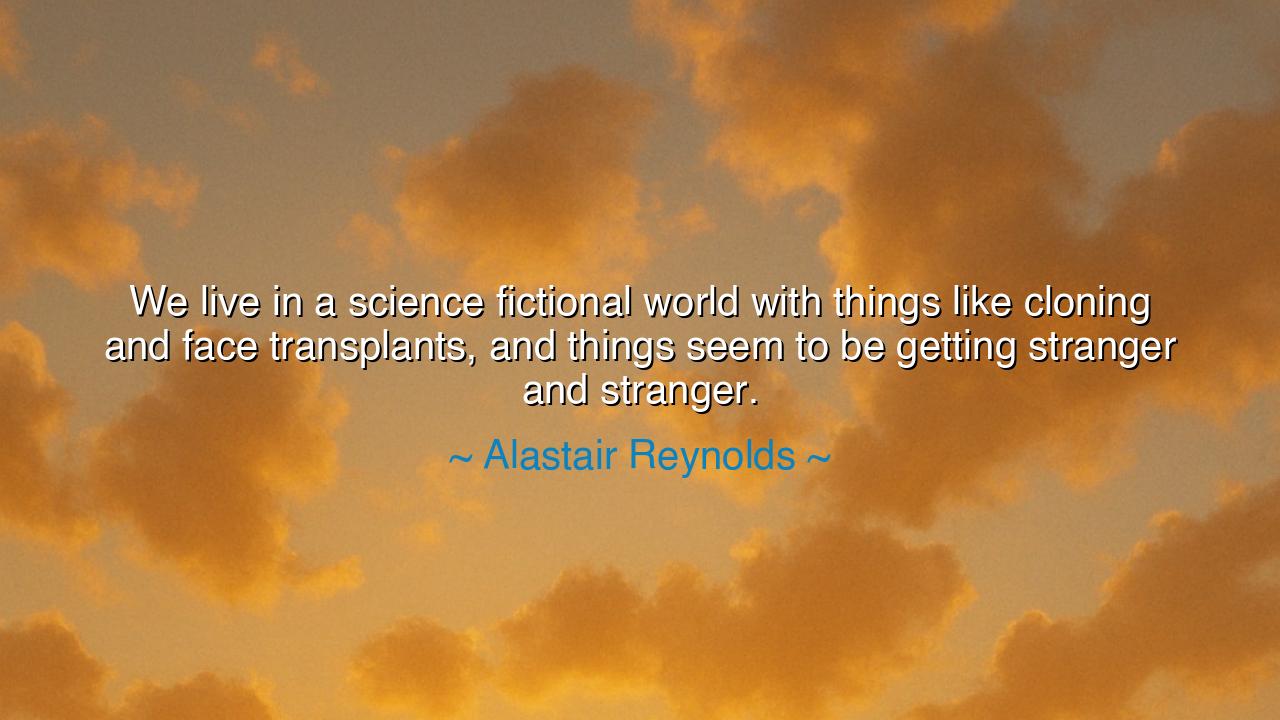
We live in a science fictional world with things like cloning and
We live in a science fictional world with things like cloning and face transplants, and things seem to be getting stranger and stranger.






Listen, O children of the earth, for the words of Alastair Reynolds echo through the corridors of time, drawing our attention to a profound truth about the world in which we live. "We live in a science fictional world with things like cloning and face transplants, and things seem to be getting stranger and stranger." These words carry the weight of wonder and awe, for Reynolds speaks of a world where the impossible is no longer just a fantasy, but a reality. Cloning, face transplants, and other such marvels were once confined to the realms of science fiction—stories of distant futures where science and technology had reached unimaginable heights. Yet now, these concepts have entered the fabric of our modern lives, and the world, in its mystery, becomes ever stranger, ever more wondrous.
In the time of the ancients, O children, the world was governed by the rhythms of the natural world, by forces that seemed unchanging and beyond human control. The Greeks and Romans believed in the power of the gods, and while they had their philosophers and mathematicians, their understanding of the world was limited to what could be seen with the eye or understood through reason. The idea of changing life itself, of manipulating nature at the deepest level, would have seemed not just strange, but impossible. Yet, the ancients dreamed, and in their dreams, they planted the seeds of what would one day become modern science. Reynolds’s words remind us that what was once thought of as fantasy has now come to life, and we must now confront the implications of this new reality.
Think, O children, of the ancient tale of Prometheus, the Titan who defied the gods to bring fire to humanity. In his bold act, Prometheus gave mankind the gift of knowledge—a gift that would forever change the course of human history. But with that gift came the burden of knowledge, the understanding that with power comes responsibility. Cloning and face transplants—the very things that once belonged to the mythic realms of gods and heroes—are no longer dreams. They are real technologies, and with their advent, we must ask: what are the consequences of wielding such power? Just as Prometheus faced the wrath of the gods for his gift to humanity, so too must we, in this modern age, face the moral and ethical challenges that come with the ability to reshape life itself.
In more recent times, scientific progress has moved beyond the pages of fantasy and into the very fabric of our world. In the 20th century, the discovery of DNA and the mapping of the human genome opened new frontiers in our understanding of life. Cloning, once confined to the minds of speculative writers like H.G. Wells, became a reality with the birth of Dolly the sheep, the first cloned mammal. This was a momentous event, for it revealed that we could replicate life, creating creatures from cells, as though we were mimicking the work of the gods. And yet, with each new advancement, the world grows stranger. Face transplants, once the domain of speculative fiction, have been performed with real human beings, offering them a chance at a new identity, a new life. Reynolds’s words remind us that the line between science fiction and science fact has blurred, and we must now learn to navigate this strange new world we have created.
But what are the consequences of this power, O children? The world is changing, and as science progresses, the very nature of life, identity, and morality is being called into question. Can we truly understand the implications of cloning, of creating life in the image of human beings? What of face transplants, which alter the very identity of a person, replacing one’s outward appearance with another’s? These technologies, though wondrous in their potential, bring with them questions that cannot be answered by science alone. They require deep reflection on ethics, on human nature, and on the boundaries of what it means to be human.
The lesson, O children, is one of caution and wisdom. As we venture into this new age of science fiction made real, we must not be blinded by the wonder of the possibilities before us. Science, like the fire Prometheus brought to humanity, is a powerful gift. It can heal, it can transform, and it can empower. But with this gift comes the responsibility to wield it with care, to understand the consequences of our actions, and to recognize that the future we are creating is shaped not just by the tools we have, but by the choices we make.
So, O children, let the words of Alastair Reynolds guide you as you navigate this new world. The realm of science fiction is no longer distant; it is here, among us. And with each new discovery, ask yourself: what is the purpose of this knowledge? How can it be used to serve humanity, to protect the dignity of life, and to preserve the essence of what makes us human? As we stand on the precipice of the future, let us embrace the wonders of science with humility, recognizing that we are the stewards of these new powers, and it is our responsibility to shape the world wisely, with integrity and foresight.






AAdministratorAdministrator
Welcome, honored guests. Please leave a comment, we will respond soon